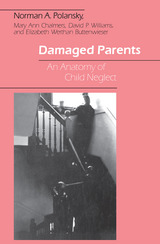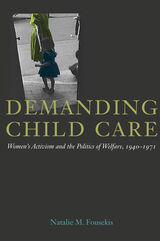4 start with D start with D

"Norman Polansky and his colleagues have produced a truly remarkable book. . . . One of the consequences of [the] relative invisibility of child neglect is that we also know less about it. But this book will help to correct that for it contains reports of findings from two systematic efforts to define, measure, classify, and understand child neglect."—Thomas M. Young, Social Service Review

During World War II, as women stepped in to fill jobs vacated by men in the armed services, the federal government established public child care centers in local communities for the first time. When the government announced plans to withdraw funding and terminate its child care services at the end of the war, women in California protested and lobbied to keep their centers open, even as these services rapidly vanished in other states.
Analyzing the informal networks of cross-class and cross-race reformers, policymakers, and educators, Demanding Child Care: Women's Activism and the Politics of Welfare, 1940–1971 traces the rapidly changing alliances among these groups. During the early stages of the childcare movement, feminists, Communists, and labor activists banded together, only to have these alliances dissolve by the 1950s as the movement welcomed new leadership composed of working-class mothers and early childhood educators. In the 1960s, when federal policymakers earmarked child care funds for children of women on welfare and children described as culturally deprived, it expanded child care services available to these groups but eventually eliminated public child care for the working poor.
Deftly exploring the possibilities for partnership as well as the limitations among these key parties, Fousekis helps to explain the barriers to a publically funded comprehensive child care program in the United States.

Building on their previous research, Huber and Stephens show how high wages and generous welfare states are still possible in an age of globalization and trade competition.

As her little boy plays at a day care center across the street, Michelle, an unmarried teenager, is in algebra class, hoping to be the first member of her family to graduate from high school. Will motherhood make this young woman poorer? Will it make the United States poorer as a nation? That's what the voices raised against "babies having babies" would have us think, and what many Americans seem inclined to believe. This powerful book takes us behind the stereotypes, the inflamed rhetoric, and the flip media sound bites to show us the complex reality and troubling truths of teenage mothers in America today.
Would it surprise you to learn that Michelle is more likely to be white than African American? That she is most likely eighteen or nineteen--a legal adult? That teenage mothers are no more common today than in 1900? That two-thirds of them have been impregnated by men older than twenty? Kristin Luker, author of the acclaimed Abortion and the Politics of Motherhood, puts to rest once and for all some very popular misconceptions about unwed mothers from colonial times to the present. She traces the way popular attitudes came to demonize young mothers and examines the profound social and economic changes that have influenced debate on the issue, especially since the 1970s. In the early twentieth century, reformers focused people's attention on the social ills that led unmarried teenagers to become pregnant; today, society has come almost full circle, pinning social ills on sexually irresponsible teens.
Dubious Conceptions introduces us to the young women who are the object of so much opprobrium. In these pages we hear teenage mothers from across the country talk about their lives, their trials, and their attempts to find meaning in motherhood. The book also gives a human face to those who criticize them, and shows us why public anger has settled on one of society's most vulnerable groups. Sensitive to the fears and confusion that fuel this anger, and to the troubled future that teenage mothers and their children face, Luker makes very clear what we as a nation risk by not recognizing teenage pregnancy for what it is: a symptom, not a cause, of poverty.
READERS
Browse our collection.
PUBLISHERS
See BiblioVault's publisher services.
STUDENT SERVICES
Files for college accessibility offices.
UChicago Accessibility Resources
home | accessibility | search | about | contact us
BiblioVault ® 2001 - 2024
The University of Chicago Press









